|
|
|
Sort Order |
|
|
|
Items / Page
|
|
|
|
|
|
|
| Srl | Item |
| 1 |
ID:
127211
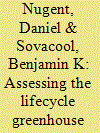

|
|
|
|
|
| Publication |
2014.
|
| Summary/Abstract |
This paper critically screens 153 lifecycle studies covering a broad range of wind and solar photovoltaic (PV) electricity generation technologies to identify 41 of the most relevant, recent, rigorous, original, and complete assessments so that the dynamics of their greenhouse gas (GHG) emissions profiles can be determined. When viewed in a holistic manner, including initial materials extraction, manufacturing, use and disposal/decommissioning, these 41 studies show that both wind and solar systems are directly tied to and responsible for GHG emissions. They are thus not actually emissions free technologies. Moreover, by spotlighting the lifecycle stages and physical characteristics of these technologies that are most responsible for emissions, improvements can be made to lower their carbon footprint. As such, through in-depth examination of the results of these studies and the variations therein, this article uncovers best practices in wind and solar design and deployment that can better inform climate change mitigation efforts in the electricity sector.
|
|
|
|
|
|
|
|
|
|
|
|
|
|
|
|
| 2 |
ID:
150656


|
|
|
|
|
| Summary/Abstract |
A decision-making model was constructed to assist remote Australian Indigenous communities select appropriate climate change mitigation programs. The Resilient Community and Livelihood Asset Integration Model (ReCLAIM) comprises six steps that focus on community assets and aspirations. The second of these steps is to determine the baseline carbon profiles of communities based on six sources of carbon emissions: materials, construction processes, stationary energy, transport, water systems and waste. The methodology employed an annualised lifecycle analysis of housing materials and construction, and an annual inventory of other emission sources. Profiles were calculated for two remote communities and compared to the Australian average and also average electricity consumption by remote communities in the Northern Territory.
|
|
|
|
|
|
|
|
|
|
|
|
|
|
|
|
| 3 |
ID:
169859
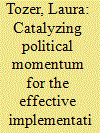

|
|
|
|
|
| Summary/Abstract |
This paper expands the toolkit available to consider the effectiveness of urban climate responses by examining political effectiveness in the implementation of urban decarbonization initiatives. By focusing on the politics of implementation, this approach complements dominant approaches for assessing effectiveness that emphasize greenhouse gas emission accounting. Drawing on case studies of urban building low carbon governance in Stockholm, London and San Francisco incorporating 40 expert interviews, the analysis provides insight into whether climate change mitigation measures are catalyzing political momentum that is untangling fossil fuels from institutions. It finds that urban decarbonization is gaining political momentum when it comes to new buildings, although with concerning implications for inequality and uneven development, but systemic change is limited since efforts to target existing buildings are stumbling over challenges. Two key insights are highlighted: 1) reframing the policy goal of urban climate mitigation to decarbonization productively refocuses attention on systemic change; 2) effective urban carbon governance is not only about providing instrumental tools, but it also involves triggering political dynamics that build momentum. Future urban decarbonization initiatives should consider the complementary roles of offering instrumental solutions and catalyzing political momentum through implementation.
|
|
|
|
|
|
|
|
|
|
|
|
|
|
|
|
| 4 |
ID:
094251
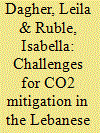

|
|
|
|
|
| Publication |
2010.
|
| Summary/Abstract |
Similar to other developing countries the electricity sector in Lebanon is monopolized by a vertically integrated public utility, Electricite Du Liban (EDL). EDL's supply is characterized by frequent and lengthy power cuts that have given rise to an alternative, informal, and unregulated backup sector, which serves to satisfy electricity demand during the extended blackout periods. This paper examines the evolvement of the backup sector and its related CO2 emissions via the use of scenario analysis. The economic and energy policy implications of each scenario are discussed and a number of policy options are presented to ensure that the growth in CO2 emissions is contained. Results clearly indicate that the backup sector plays a critical role in the success of any greenhouse gas mitigation commitment undertaken by Lebanon. A clear strategy on dealing with this sector needs to be devised simultaneously if not prior to any climate change policy at the national level.
|
|
|
|
|
|
|
|
|
|
|
|
|
|
|
|
| 5 |
ID:
148695
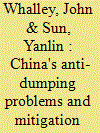

|
|
|
|
|
| Summary/Abstract |
The present paper explores the opportunities for China's regional trade agreement (RTA) initiatives to mitigate its anti-dumping problems. The paper highlights the severity and discriminatory nature of China's anti-dumping problems. The high concentration of the share of anti-dumping actions taken by the top 4 and top 8 anti-dumping initiators is noted. Our finding of a weak effect of existing RTAs on mitigating China's anti-dumping problems supports the argument that China could become more active in mitigating anti-dumping problems through RTA negotiations. An RTA can include a higher level of openness in exchange for an improvement in regional anti-dumping provisions. Case studies on RTAs involving the EU, the USA and India offer some precedents for offering inducements and modifying regional anti-dumping provisions. The approaches for China may lie in obtaining market economy status from intensive anti-dumping initiators at RTA levels and also altering regional anti-dumping provisions that could be put in place in exchange for some potential concessions.
|
|
|
|
|
|
|
|
|
|
|
|
|
|
|
|
| 6 |
ID:
134359
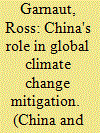

|
|
|
|
|
| Summary/Abstract |
China contributed a majority of the growth in global greenhouse gas emissions in the first 11 years of this century. The trajectory of emissions has changed radically since then, as China has implemented its Cancun 2010 commitment to reduce the 2005 emissions intensity of economic activity by 40–45 percent by 2020. The change in trajectory has been reinforced by China's new model of economic growth, with its greater emphasis on equity in income distribution, consumption and services. The large-scale deployment of low emissions technology in China is lowering the cost of transition to a low carbon economy all over the world. China's new emissions trajectory improves the opportunity for the international community to meet the 2°C climate target. It is essential that the changes in China are brought to account in shaping global mitigation ambition.
|
|
|
|
|
|
|
|
|
|
|
|
|
|
|
|
| 7 |
ID:
112328
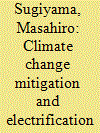

|
|
|
|
|
| Publication |
2012.
|
| Summary/Abstract |
An increasing number of mitigation scenarios with deep cuts in greenhouse gas emissions have focused on expanded use of demand-side electric technologies, including battery electric vehicles, plug-in hybrid vehicles, and heat pumps. Here we review such "electricity scenarios" to explore commonalities and differences. Newer scenarios are produced by various interests, ranging from environmental organizations to industry to an international organization, and represent a variety of carbon-free power generation technologies on the supply side. The reviewed studies reveal that the electrification rate, defined here as the ratio of electricity to final energy demand, rises in baseline scenarios, and that its increase is accelerated under climate policy. The prospect of electrification differs from sector to sector, and is the most robust for the buildings sector. The degree of transport electrification differs among studies because of different treatment and assumptions about technology. Industry does not show an appreciable change in the electrification rate. Relative to a baseline scenario, an increase in the electrification rate often implies an increase in electricity demand but does not guarantee it.
|
|
|
|
|
|
|
|
|
|
|
|
|
|
|
|
| 8 |
ID:
170274


|
|
|
|
|
| Summary/Abstract |
While the drone has become synonymous with the War on Terror, the asymmetric iconography of the battlefield is shifting. Commercially available off-the-shelf (COTS) drones are increasingly prevalent features of global battlefields, employed by non-state actors in both visualising such spaces, and the directing and inflicting of harm. As such usage increases, so too do concerns around their evolving adoption, adaptation, and potential portability into homeland spheres. While cognizant of the range of positive drone applications, it is asserted that drones nonetheless remain simultaneously bound to an inverse potential for exploitation. In examining drone risk, this article approaches the consumer drone through a series of sites and spaces through which it is technically and socially constructed. Reflecting upon industry innovation, community-driven experimentation, and evolving airspace – it calls for greater attention to the drone’s malleability, arguing that understandings of COTS drones must remain attentive to both drone potential and potential drone threat.
|
|
|
|
|
|
|
|
|
|
|
|
|
|
|
|
| 9 |
ID:
166532
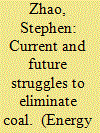

|
|
|
|
|
| Summary/Abstract |
Reductions in coal use necessary to meet the objective of keeping global temperature increase well under 2.0 °C faces serious political economic hurdles. To transition from coal, existing use must be eliminated and new growth in coal consumption must be stymied. Efforts to reduce existing consumption in a speedy manner faces challenges in domestically oriented markets where coal industry coalitions resist anti-coal policy and pursue industry protection. In addition, we identify a serious loophole in coal restraint exercised by a number of the users including: China, Japan and Korea. Continued support for coal capacity expansion abroad in both public and private sectors in these markets appears to reflect the lack of incentives, or sanctions in reining in such external capacity expansion. Such external expansion currently is not counted in nationally determined commitments for the Paris Agreement of the United Nations Framework Convention on Climate Change (Paris Agreement). Without greater national political efforts, the necessary reduction in coal use cannot be achieved.
|
|
|
|
|
|
|
|
|
|
|
|
|
|
|
|
| 10 |
ID:
094216
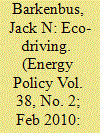

|
|
|
|
|
| Publication |
2010.
|
| Summary/Abstract |
The actions individuals can take to mitigate climate change are, in the aggregate, significant. Mobilizing individuals to respond personally to climate change, therefore, must be a complementary approach to a nation's climate change strategy. One action item overlooked in the United States has been changing driver behavior or style such that eco-driving becomes the norm rather than the exception. Evidence to date indicates that eco-driving can reduce fuel consumption by 10%, on average and over time, thereby reducing CO2 emissions from driving by an equivalent percentage. A sophisticated, multi-dimensional campaign, going well beyond what has been attempted thus far, will be required to achieve such savings on a large scale, however, involving education (especially involving the
|
|
|
|
|
|
|
|
|
|
|
|
|
|
|
|
| 11 |
ID:
170837


|
|
|
|
|
| Summary/Abstract |
Every U.S. President in recent decades has had to respond to at least one pandemic disease. Political leadership has proven decisive. In the coming years, U.S. foreign policy will face at least three inter-related issues: today's major pandemics of AIDS, TB, and Malaria; future outbreaks with the potential to become pandemics; and rising risk from infectious diseases associated with climate change. A review of epidemiologic data shows global progress on each issue is threatened. A coordinated U.S. effort, across agencies and engaged with national and multilateral partners, could save lives and address significant foreign policy interests. Such an effort could boost economic prosperity by reducing disease-related lost productivity, which we estimate at $1.7 trillion, with returns to investment in pandemic-related global health efforts averaging 17–20 to 1. Foreign policy focus on pandemics could also address economic and social inequalities and support climate adaptation and mitigation. Pandemic-related global health spending is 0.19% of the U.S. budget—a figure that has been flat in recent years even with growing needs and significant potential gains from investment.
|
|
|
|
|
|
|
|
|
|
|
|
|
|
|
|
| 12 |
ID:
150924
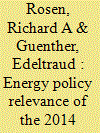

|
|
|
|
|
| Summary/Abstract |
Research which attempted to determine the macroeconomic importance of mitigating climate change through 2100 was presented primarily in Chapter 6 of the 2014 IPCC Working Group III report. Some of the findings of this chapter were then summarized in the Summary for Policy Makers (SPMs) of both the Synthesis Report, and the WGIII report. Unfortunately, these SPMs omitted key aspects of what the overall macroeconomic results for the costs and benefits of mitigating climate change actually did and did not include, how they were produced, and a careful assessment of their uncertainty and scientific validity. Yet, many of the major omissions were acknowledged deep in the text of Chapter 6, but were not revealed to the public. We conclude, therefore, that neither of these SPMs was useful for energy policy makers and energy managers, and they were misleading due to their many key omissions. Finally, we recommend several improvements that can be made to integrated assessment modeling methodologies so that the macroeconomic analysis of mitigating climate change resulting from the use of such models can be more relevant and useful to energy policy makers in the future, and can be communicated to them better.
|
|
|
|
|
|
|
|
|
|
|
|
|
|
|
|
| 13 |
ID:
188906
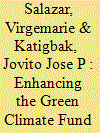

|
|
|
|
|
| Summary/Abstract |
The prevailing issues in the Green Climate Fund on implementation and governance can be seen as symptoms of the ills of the international climate finance architecture. These are compounded by the inadequate financial support provided by developed countries to developing countries and the low volume of funding channelled to adaptation projects. Evidently, the cited issues highlight the need to fully integrate the principles of justice and equity into the global climate change regime. Thus, this policy brief discusses the key challenges related to climate finance, and outlines several options and considerations on improving the Green Climate Fund operations using a climate justice lens. This paper intends to take a more normative and ethical discussion on the topic of climate finance.
|
|
|
|
|
|
|
|
|
|
|
|
|
|
|
|
| 14 |
ID:
188916
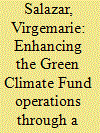

|
|
|
|
|
| Summary/Abstract |
The prevailing issues in the Green Climate Fund on implementation and governance can be seen as symptoms of the ills of the international climate finance architecture. These are compounded by the inadequate financial support provided by developed countries to developing countries and the low volume of funding channelled to adaptation projects. Evidently, the cited issues highlight the need to fully integrate the principles of justice and equity into the global climate change regime. Thus, this policy brief discusses the key challenges related to climate finance, and outlines several options and considerations on improving the Green Climate Fund operations using a climate justice lens. This paper intends to take a more normative and ethical discussion on the topic of climate finance.
|
|
|
|
|
|
|
|
|
|
|
|
|
|
|
|
| 15 |
ID:
133241


|
|
|
|
|
| Publication |
2014.
|
| Summary/Abstract |
The need to understand the scope for comparative lesson-drawing on national-level climate mitigation policy has acquired added significance due to the current impasse in international-level governance. Greater policy learning or lesson-drawing among peers at the national level could, to an extent, foster meaningful developments by overcoming generalised international apathy and inaction. In this respect, we analyse the features of one significant example of national climate policy in order to examine the scope for lesson-drawing, thereby setting out a normative research agenda. The UK Climate Change Act 2008 remains one of the few examples of legally enshrined national mitigation legislation and hence provides a relevant, but surprisingly under-researched, source of learning for policy-makers worldwide. By analysing its development, critical features and implementation, this article shows that-despite criticism of the sustainability and implementation effectiveness of the Act-some aspects of the policy could provide lessons for other states, and hence are potentially transferable extraterritorially, although lesson-drawing itself is conditional on contextual constraints.
|
|
|
|
|
|
|
|
|
|
|
|
|
|
|
|
| 16 |
ID:
125842
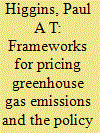

|
|
|
|
|
| Publication |
2013.
|
| Summary/Abstract |
Four cost-effective frameworks for pricing greenhouse gas emissions currently receive widespread attention: cap-and-trade, emission fees, and hybrid cap-and-trade approaches that include upper or lower limits on permit prices (price ceilings or floors). This paper develops a fifth framework that uses an emission fee with an upper limit on the quantity of emissions-a quantity ceiling-and compares the impact of each framework on emission prices and quantities. Cap-and-trade with a price ceiling minimizes price increases for emitting activities in all cases whereas an emission fee with a quantity ceiling maximizes emissions reductions. Thus, the choice of framework influences policy outcomes because each framework is more or less suited to particular policy goals. Whether pursuing one potential policy goal serves society's interests best depends on the eventual consequences of climate damage and emissions pricing, which are uncertain when policy choices are made. Policy updating over time may reduce but likely cannot entirely eliminate the differences in outcome that arise due to framework choice. Therefore, the "best" framework for emissions pricing depends on subjective preferences regarding the relative importance of different policy objectives, most notably whether one is more risk averse to climate damages or emissions price increases.
|
|
|
|
|
|
|
|
|
|
|
|
|
|
|
|
| 17 |
ID:
175907


|
|
|
|
|
| Summary/Abstract |
This article investigates empirical evidence from the Canadian oil and gas sector regarding the key factors behind corporate decision-making in moving from “business as usual” to tackling climate change. The findings are based on survey data from a sample of 127 managers. Logit regression analysis revealed that pressure from government, customers, suppliers and competitors increased the likelihood that firms will adopt a low-carbon strategy. Compared to other stakeholders, investors and employees may not be as strongly committed to adopting a climate change strategy. Media and corporate sustainability reporting were not found to be important factors in influencing firms to adopt low-carbon strategies, while command-and-control policies and firms’ perceptions of the risk of resource scarcity were factors that seemed to have the most influence on corporate decision-making. Multinational oil and gas firms headquartered in Canada appeared to be more likely to adopt low-carbon strategies than foreign multinational oil and gas firms. This research contributes to a better understanding of the key factors that affect corporate decision-making concerning GHG emission-reduction policies. Regulatory action based on significant engagement with affected stakeholders would appear to be particularly important in creating a broad base of support and pressure for action on climate change.
|
|
|
|
|
|
|
|
|
|
|
|
|
|
|
|
| 18 |
ID:
096134


|
|
|
|
|
| Publication |
2010.
|
| Summary/Abstract |
The object of the United Nations Climate Change Conference in Copenhagen in December 2009 was to reach an agreement on a new international legal architecture for addressing anthropogenic climate change post-2012. It failed in this endeavour, producing a political agreement in the form of the Copenhagen Accord. The Accord sets an ambitious goal of holding the increase in the global average surface temperature to below 2 °C. This paper describes 45 CO2-only mitigation scenarios that provide an indication of what would need to be done to stay within the 2 °C limit if the international climate negotiations stay on their current path. The results suggest that if developed countries adopt a combined target for 2020 of =20% below 1990 levels, global CO2 emissions would probably have to be reduced by =5%/yr, and possibly =10%/yr, post-2030 (after a decade transitional period) in order to keep warming to 2 °C. If aggressive abatement commitments for 2020 are not forthcoming from all the major emitting countries, the likelihood of warming being kept within the 2 °C limit is diminutive.
|
|
|
|
|
|
|
|
|
|
|
|
|
|
|
|
| 19 |
ID:
186447


|
|
|
|
|
| Summary/Abstract |
Security of supply concerns are at the forefront of the public debate. The pandemic and post-pandemic times have demonstrated that preparing for global shocks requires the quick availability of some essential goods and services, including energy. Private incentives are typically insufficient for an economy to be prepared for rare events with large negative impacts. Instead, governments and preferably supranational institutions should implement mechanisms that make sure that prevention, detection and mitigation measures are taken. The economics of electricity capacity mechanisms provides valuable lessons for the provision of essential goods in such events, which need to be complemented with other elements aimed at mitigating the causes and impacts of potential crises.
|
|
|
|
|
|
|
|
|
|
|
|
|
|
|
|
| 20 |
ID:
150778


|
|
|
|
|
| Summary/Abstract |
The article examines the climate action plans (CAPs) of local governments (LGs) in Denmark. Applying a quantitative content analysis approach, all Danish LG action plans within the climate and energy field has been collected and coded, giving insight into the extent of LG CAPs. We assess the extent, targets and scope of LG CAPs and find that Danish LGs are highly involved in mitigation activities with a widespread CAP adoption and an overall high degree of sectoral coverage on base year accounts and action plans, albeit with some significant shortcomings. If current LG CAPs were to form the basis of a decentralised climate governance system, some improvements in target level and sectoral coverage should be implemented. The utilization of regional supporting structures facilitating a gradual improvement seems especially promising. In addition the research points to the significant mitigation potential of considering the full spectrum of local government actors, not simply the pioneers and how local CAPs outside urban pioneers require additional local policy framing to succeed. Focusing on the mutual benefits for national and local actors of an integrated planning system, and the multiple benefits locally, will be key in motivating further action.
|
|
|
|
|
|
|
|
|
|
|
|
|
|
|
|
|
|
|
|
|